
"Ensemble MIA unites over 60 improvisers and experimental musicians from all over the world, who participated in MIA 2016 - 7th Encontro de Música Improvisada de Atouguia da Baleia (Improvised Music Encounter) festival. The event ...
In Stock
Quantity in Basket: None
Log In to use our Wish List
Shipping Weight: 3.00 units
EU & UK Customers:
Discogs.com can handle your VAT payments
So please order through Discogs
Sample The Album:
Adriano Orru-Doublebass
Afonso Castanheira-Doublebass
Aleksander Baczkowski-Alto Sax
Alvaro Rosso-Doublebass
Andre Tasso-Electric Guitar
Antoine Gilleron-Trumpet
Antonio Martins-Electric Bass
Antonio Ramos-Tenor Sax
Ayis Kelpekis-Alto Sax
Bruno Goncalves-Electric Guitar
Bruno Parrinha-Alto Sax
Carlo Mascolo-Trombone
Carlo Mezzino-Electronics
Carlos Canao-Gong
Cortez-Lamont III-Electric Guitar
Desmarques-Electric Guitar
Eduardo Sergio-Xilophone
Fernando Guiomar-Electric Guitar
Fernando Simoes-Conductor
Francois Choiselat-Conductor
Guy Strale-Percussion, Kalimba
Hannah White-Voice
Ian Thompson-Cello
Jean-Marc Foussat-Electronics
Jesus Asenjo-Accordion
Joao Braz Goncalves-Cello -
Joao Madeira-Doublebass
Joao Pedro Viegas-Clarinet
Jordina Milla-Piano
Jorge Nuno-Electric Guitar
Karoline Leblanc-Piano
Laura Marques-Voice
Lorenzo Lustri-Electronics
Luis Fernandes-Percussion
Luis Guerrero-Trumpet
Luiz Rocha-Clarinet
Marco Loprieno-Sopranino Sax
Marco Oliveira-Bass Clarinet
Marco Oliveira-Bass Clarinet
Maria do Mar-Violin
Maria Radich-Voice
Marialuisa Capurso-Voice
Mario Rua-Drums
Mark Lotz-Conductor, Piccolo Flute
Mauro Medda-Trumpet
Melaina Barnes-Voice
Mestre Andre-Tenor Sax, Electronics
Mia Zabelka-Conductor
Miguel Falcao-Doublebass
Miguel Mira-Cello
Miquel Jorda-Sopranino Sax
Miquel Jorda-Sopranino Sax
Noel Taylor-Clarinet, Conductor
Paulo Chagas-oboe
Paulo Curado-Flute
Paulo Lopes-Drums
Paulo Silva-Acoustic Guitar
Pedro Castello Lopes-Percussion
Pedro Santo-Drums
Quinto Fabriziani-Violin
Rui Sousa-Electric Bass
Ryoko Imai-Percussion
Sarah Claman-Violin
Silvia Corda-Piano, Conductor
Stephen Shiell-Percussion
Ulf Mengersen-Doublebass
Click an artist name above to see in-stock items for that artist.
UPC: 5609063404395
Label: Creative Sources
Catalog ID: cs439
Squidco Product Code: 24261
Format: CD
Condition: New
Released: 2017
Country: Portugal
Packaging: Cardboard Gatefold
Live recording during MIA 2016.
"Ensemble MIA unites over 60 improvisers and experimental musicians from all over the world, who participated in MIA 2016 - 7th Encontro de Música Improvisada de Atouguia da Baleia (Improvised Music Encounter) festival. The event took place in Portugal in May 2016, at the Philharmonic Society of the historical village of Atouguia de Baleia. For each session, the artists were grouped in smaller ensembles. Their improvisations are documented on Live 2016 album, released by Creative Sources in 2017.
Ensemble #1
Conducted by Mia Zabelka
Acoustic Guitar - Paulo Silva
Clarinet - Luiz Rocha, Noel Taylor
Doublebass - Alvaro Rosso, João Madeira
Electric Guitar - Bruno Gonçalves, Cortez-Lamont III, Fernando Guiomar
Flute - Paulo Curado
Gong - Carlos Canão
Percussion - Pedro Castello Lopes
Piano - Silvia Corda
Violin - Maria do Mar, Sarah Claman
Xilophone - Eduardo Sérgio
Ensemble #2
Conducted by Mark Lotz
Alto Sax - Bruno Parrinha
Cello - Ian Thompson, Miguel Mira
Doublebass - Adriano Orrù
Electric Bass - António Martins
Electric Guitar - Desmarques, Jorge Nuno
Percussion - Stephen Shiell
Percussion, Kalimba - Guy Strale
Piano - Jordina Millà
Sopranino Sax - Marco Loprieno
Tenor Sax - António Ramos
Tenor Sax, Electronics - Mestre André
Voice - Hannah White, Melaina Barnes
Ensemble #3
Conducted by François Choiselat
Accordion - Jesus Asenjo
Bass Clarinet - Marco Oliveira
Cello - João Braz Gonçalves
Electric Bass - Rui Sousa
Electric Guitar - André Tasso
Electronics - Carlo Mezzino, Lorenzo Lustri
Percussion - Luis Fernandes
Piano - Karoline Leblanc
Sopranino Sax - Miquel Jordà
Trombone - Carlo Mascolo
Trumpet - Mauro Medda
Violin - Quinto Fabriziani
Voice - Laura Marques
Ensemble #4
Conducted by Noel Taylor
Acoustic Guitar - Paulo Silva
Alto Sax - Bruno Parrinha
Clarinet - João Pedro Viegas
Doublebass - Alvaro Rosso
Drums - Mário Rua
Electric Bass - Rui Sousa
Electric Guitar - André Tasso, Fernando Guiomar
Percussion, Kalimba - Guy Strale
Piano - Karoline Leblanc
Sopranino Sax - Marco Loprieno , Miquel Jordà
Trumpet - Luis Guerrero, Mauro Medda
Violin - Maria do Mar
Ensemble #5
Conducted by Silvia Corda
Alto Sax - Aleksander Baczkowski, Ayis Kelpekis
Cello - Miguel Mira
Doublebass - Miguel Falcão, Ulf Mengersen
Drums - Pedro Santo
Electronics - Lorenzo Lustri
Oboé - Paulo Chagas
Percussion - Ryoko Imai
Tenor Sax - António Ramos
Voice - Maria Radich, Marialuisa Capurso
Xilophone - Eduardo Sérgio
Ensemble #6
Conducted by Fernando Simões
Accordion - Jesus Asenjo
Bass Clarinet - Marco Oliveira
Clarinet - Luiz Rocha
Doublebass - Afonso Castanheira
Drums - Paulo Lopes
Electronics - Jean-Marc Foussat
Flute - Paulo Curado
Piano - Jordina Millà
Piccolo Flute - Mark Lotz
Tenor Sax, Electronics - Mestre André
Trombone - Carlo Mascolo
Trumpet - Antoine Gilleron
Violin - Quinto Fabriziani, Sarah Claman"
"If the evenings of the MIA - Meeting of Improvised Music of Atouguia da Baleia are filled by performances of groups formed by lots, combining in varied ways the musicians who participate in this "sui generis" festival held every year in the middle of May in the municipality of Peniche , The evening latches are held with ensembles concerts that bring together everyone present. With a particularity: some of these musicians are given the task of conducting the broad formations according to the same principle of who plays: improvising the orchestral direction. The 2016 edition will be one in which the principles followed by Ensemble MIA (mutant collective that usually unfolds in six, to cover the total number of members - 70 last year) had better practical results, and hence the edition Of this CD with the records of these precious moments. Each of the six themes included has its conductor, namely the Austrian violinist Mia Zabelka, the German flutist Mark Alban Lotz, the French vibraphonist François Choiselat, the British clarinetist Noel Taylor, the Italian pianist Silvia Corda and the Portuguese trombonist Fernando Simões. The approaches are quite different, ranging from Walter Thompson's methods of Soundpainting applied by Choiselat in "That Gestury Glossary" to the minimal interventions, practically reduced to the management of the blows, of Lotz in "A Kind of Pseudo-Lyrical Abyss". In the middle are Butch Morris Conduction applied by Taylor in "Sobriety", perhaps the most deterministic of all although the signage is simpler than that of Thompson, and the directions of Zabelka ("Tribal Exhilaraton") and Rope (" Elegance and Intuition "), which are very direct and mainly oriented towards the coordination of timbres. On the other hand, the intervention directed by Simões ("The Rebellion of Fired Musicians") has a place apart, for having a staging and following a theatrical concept and comic effect, as well as for putting a critical question to the very idea of improvisation With maestro, that of symphonic music that overlaps the will of an individual to the collective. Fernando Simões was expelling from the stage who did not comply with his indications, causing some discomfort until he understood (not even the musicians on stage knew that this was the game) that it was a gag. In the end, only the drummer stayed. But the best was yet to come, and this time without the conductor's knowledge: the expelled improvisers who had portable instruments crowded into the back of the room and, after the last touch of the drumsticks, played again, to the general laughter of the assistance and affirmation of the Your freedom. This is how the album ends, letting us think."-REP, Jazz.pt
Artist Biographies
• Show Bio for Adriano Orru "Composer and double bass player Adriano Orrù was born in Nuoro, Italy in 1958 and now lives and works in Cagliari. He devotes his time to jazz, radical improvisation, chamber music. He also works as a music teacher. Orrù has collaborated with artists such as Giancarlo Schiaffini, Paolo Fresu, Tony Oxley, Lenka Zupkova, AN MOKU, Vahid Jahandari, Paulo Chagas, Gianni Mimmo, Marco Colonna, Carlo Mascolo, Andrea Massaria, Mauro Sambo, Joao Pedro Viegas, Guy-Frank Pellerin, Maria Do Mar, Luiz Rocha, Samuel Hällkvist, François Choiselat, Stefan Schimdt, Mia Zabelka, Ettore Fioravanti, Roberto Cipelli, Marco Tamburini, Tino Tracanna, Maria Radich, Andy Gravish, Tim Hodkinson, Martin Mayes, Marcello Magliocchi, Victor Nubla, Simon Balestrazzi, Silvia Corda, Nicola Guazzaloca, Takatsuna Mukai, Henning Frimann, Renato Ciunfrini, Guro Skumsnes Moe, Håvard Skaset, Angelo Contini, G.P. Campus, Corrado Altieri, Billy Sechi, Monica Serra, Mauro Cossu, Clara Murtas, White Noise Generator, Stella Veloce, Sebastiano Meloni, Alessandro Garau, Stefano Figliola, Alessandro Olla, Paolo Angeli, Manuel Attanasio, Variable Geometry Orchestra, Moex Ensemble, Elia Casu, Mauro Usai, Paolo Sanna, Roberto Pellegrini, Enrica Spada, Carla Onni, Giacomo Calabrese, Sara Marasso, Mario Faticoni, Paula Gimeno, Yali Herbet, Raffaello Ugo, Tonino Casula. He has recorded for Splasc(h), Digitalis Purpurea, Comar23, TiConZero, Big Round Records, Setola di maiale, Magick With Tears, LaBèl, Pan y Rosas, Endtitles, Creative Sources, Boogie Post Recordings, Azoth. Together with the pianist Silvia Corda, he co-wrote a performance for six musicians and a spoken voice entitled "Portrait in Three Colors" and dedicated to Charles Mingus. Orrù works with the Silvia Corda Trio on a regular basis, and several of his compositions can be heard on the trio's Impronte, a CD produced by Splasc(h) in 2001. In 2004, he established the composition and improvisation ensemble Impromptu featuring Giancarlo Schiaffini. In 2005, he published a live CD of the Impromptu quintet and the first recording in his own name: Solos and Duets, a work dedicated to double bass solos and duets with Giancarlo Schiaffini on trombone, Paolo Angeli on Sardinian prepared guitar, and Roberto Pellegrini on percussion. He has also worked with Moex, an ensemble focused on electric-acoustic experimentation. In 2010 Big Round Records has published a CD "Improvised pieces for trio" with Sebastiano Meloni on the piano and Tony Oxley on drums. A new CD titled "Untitled Soundscapes" performed by A Sphere Of Simple Green (Silvia Corda on prepared piano, Simon Balestrazzi on laptop and Adriano on the double bass) was released in 2011 by the label Magick with tears. A free downloadable EP, "Hèsperos", was released by LaBèl netlabel in 2011 as well, the work is a double-bass solo. In 2012 the label Setola di maiale released "Collettivo di resistenza culturale" a full improvised concert live recorded. In 2013 a new release together with Giancarlo Schiaffini a CD live recorded whose title is "Gramsci in concert", Adriano features also in two tracks of "Sunya" the first release by Takatsuna Mukai. Also in 2013 the label LaBèl releases "The Breath" a Cd dedicated to Steve Lacy by the Geometrie Variabili quartet. In March 2014 a new release for Pan y Rosas, the CD Palimpsest where adriano plays the electric bass in ten duets together with Mauro Sambo, Paulo Chagas and Silvia Corda. Two new releases appear in the late 2015: "Orrù Mar Rocha - Live at MIA 2015" for Endtitles, and "Stanze", by Palimpsest Trio (Chagas, Corda, Orrù) for Pan y Rosas. During 2017 two new CDs have been released: "For Massas" (Viegas, Pellerin, Corda, Orrù) for Pan y Rosas and "With an Oblique Glance" (Balestrazzi, Corda Orrù) for Azoth. Reviews of his work have appeared in Down Beat, Il Manifesto, Musica Jazz, Cadence, Jazzit, Cuadernos de Jazz, All About Jazz, L'Unione Sarda, La Nuova Sardegna, Double Bassist, Jazzword, One Final Note, Flash Art, Jazz Portugal and on Radio 3 RAI. He has performed at events such as Isole che parlano, Time in Jazz, Ai confini tra Sardegna e Jazz, Concerts of the Nuoro Jazz Seminary, Jazz d'autore, Cerisano Jazz, Varese in Jazz, Jazz in Sardinia, Veneto Jazz, San Teodoro Jazz, Sardegna Arte Fiera, Musica sulle Bocche, The Barcelona Lem Festival, Senni Jazz, Isole che parlano, The Signal Festival, Festival Spaziomusica, MIA Festival (Portugal), Creative Fest (Lisbon), Marathon Der HochKulturen (Zurich), Clockstop Fest (Noci), Contemporary Donori), Free Flow Fest (Irsina), Tempo al Tempo (Bruxelles), Autunno Danza (Cagliari), Istituto Italiano di Cultura Madrid, BCN Improfest (Barcelona)." ^ Hide Bio for Adriano Orru • Show Bio for Alvaro Rosso Alvaro Rosso is a Portuguese double bassist, a member of Variable Geometry Orchestra, ZMVR 4tet, Orgonite, Croniques 3, and String Theory. ^ Hide Bio for Alvaro Rosso • Show Bio for Bruno Parrinha "Bruno Parrinha - alto sax / soprano, Clarinet Sb / Alto, flute Around the age of 10 began playing the clarinet. At 17 he bought a flute and entered the Academy of Music where he Amateurs solfeggio and instrument with Paulo Curado for two years . Later he was always playing clarinet and tenor saxophone ( self-taught ) and at age 21 he was invited to join the band Pop Radar Gaddafi with whom he recorded . Later he was cast of musicians on the play " Vieux Carré " in teatro da Graça playing tenor sax . Spent a year on the scene . At 87 he began to attend formations of Sei Miguel resulting in vinyl LP recorded at 88 " Songs love and against terrorism ." Since then he has dedicated his commitment to free improvisation and has participated in numerous trainings and concerts with illustrious musicians including Rodrigo Amado , Rodrigo Pinheiro , Miguel Mira , João Lucas , Paulo Curado , Ernesto Rodrigues , Guilherme Rodrigues , Ulrich Mitzlaff , Manuel Guimarães Cyril Bondi , " D' Incise ," Raphael Ortiz , Nicolaus Gerwinsky , Phill Niblock , Raymond McDonald , Victor Nubla , Nuno Rebelo , Marco Franco, Gabriel Ferrandini , Hernani Faustino , Luís Lopes , José Oliveira , Carlos Santos , Carlos " Zingaro " João Pedro Viegas , Victor Rua , Abdul " moimême " , Luís Vicente , João Lancaster , Luis Gil , Paulo Pimentel , Francisco Andrade , Albert Cicera and many others. Presently a part of groups : ARGUE, IKB , VGO , Miguel Mira Quartet , Open Mind and Puma. " ^ Hide Bio for Bruno Parrinha • Show Bio for Carlo Mascolo "Carlo Mascolo is an improviser musician with different skills and versatile languages. He plays jazz, world music, computer music and the creative music in the direction of research of new sound textures, from solo to the ensemble. Carlo Mascolo is the founder of the "Kerlox Dynamic Band - transcultural music" and he has been playing with the collective Embryo since 2006. He is the art director of the Free Flow Festival in Italy since 2012. As educator, he was teacher of Jazz Trombone at the Conservatory of music "Nino Rota" in Monopoli (Italy) and teacher of Brass at the ESNCM in Jerusalem, at the AlKamandjati music center and in the refugee camp of Al-Amari, Qalandia, Jenin and Nablus (Palestine) . He played in several festivals and many clubs in Europe and worldwide (Italy, Germany, Spain, Czech Republic, Belgium, Holland, Turkey, Palestine, Morocco, Colombia, Argentina, U.S.A., Portugal) with Embryo, Christian Burchard, Michele Lomuto, Gianni Lenoci, Steve Potts, Antonello Salis, Marcello Magliocchi, Mik Quantius, Lothar Stahl, Jens Pollheide, Lori Goldston, Nicola Guazzaloca, Suricato, Pacho Davila, Moktar Ghania, Allen Blairman, Yuri Parvenov, Abdul Moimeme, Yedo Gibson, Vasco Trilla, Jean- Marc Foussat, Luiz Rocha, Nicolas Chientaroli, Dirar Kalash, Mia Zabelka, Carlos Zingaro, Ada Rave, Renato Ferreira, George Hadow, Paulo Chagas, Okay Temiz, Hakan Ali Tocker, Marshall Allen, Charles Gayle and many others." ^ Hide Bio for Carlo Mascolo • Show Bio for Fernando Simoes "Fernando Simões is a trombonist based in Lisbon, Portugal, known for the groups Ensemble MIA, ikb, PREC, The Limbo Ensemble, Variable Geometry Orchestra." ^ Hide Bio for Fernando Simoes • Show Bio for Jean-Marc Foussat "Jean-Marc Foussat (born March 19, 1955 in Oran ) is a French composer and improvisational musician ( guitar, piano, live electronics ). Since the mid-1970s, Foussat had belonged to groups such as Lézard Marçio, in which he contributed the sounds of concrete music with magnetic tapes. In 1981, he finished his first solo album, Abattage, which was released in 1983. In the ensemble Marteau Rouge (with the guitarist Jean-François Pauvros and the drummer Makoto Sato), he also collaborated with Evan Parker. Together with the saxophonist Sylvain Guérineau, he formed the duo Aliquid, which also appeared with Joe McPhee ( Quod, 2014). In addition to soloprograms, he also starred with Noël Akchoté / Roger Turner, Samuel Blaser, Émilie Lesbros, Jean-Luc Cappozzo, Sophie Agnel, Daunik Lazro and numerous other musicians, as well as the Fortuna 21 Octet of Raymond Boni and the department of education psychique on." ^ Hide Bio for Jean-Marc Foussat • Show Bio for Joao Madeira Joao Madeira: "I was born in Lisboa and I've dedicated most of my energy to the doublebass since I was 12. When I went to study at the Conservatório de Lisboa my role model was doublebassist João Panta Nunes, and lately my studies were oriented by Jorge Lee, at Cascais. I have a degree in Musicology, investigation work on Fado's candidature to World Immaterial Heritage by UNESCO, and coordination of the Music Department at INATEL/FNAT. Since 1999 I have a strong activity (studio and performance) in several styles and genres, but improvised music and original composition (whatever the style...) are the places where my musical language riches its higher satisfaction and plenitude. In the recordings you are about to hear it's me who plays all the instruments. My passion is at the simple act of artistic creation. For me, music is all about musicians and genuine expression! It doesn't matter the genre neither the instrument per si. In theater I have collaborations (musician, composer, actor) with Companhia do Chapitô and Artistas Unidos, amongst others. I also love books (...) I've studied aesthetics and Portuguese literature since I remember, and love to read and write poetry." ^ Hide Bio for Joao Madeira • Show Bio for Joao Pedro Viegas João Pedro Viegas is a self-taught saxophone and clarinet player. He is the author, lead singer and saxophonist of the groups Ethnos, dr. Estranho amor and Just Jazz Friends. Since 1983 he has immersed himself in Jazz studies and music theory. His primary instruments are alto and tenor saxophones, bass clarinet and B-flat clarinet. He is known for the groups "Zíngaro" Mitzlaff Viegas Rosso 4tet, Adega Ensemble, Chagas Curado Viegas Wind Trio, Dr Estranho Amor, Unknown Shores, Ensemble MIA, Potlatch, PUI4, and Variable Geometry. ^ Hide Bio for Joao Pedro Viegas • Show Bio for Jordina Milla "Jordina Millà, pianist and improviser has been influenced by music since the early years. She graduated as a classical pianist in CODARTS University of Arts in Rotterdam, there she continued her studies and obtained the Master in piano performance. During that period Huygens Scholarship Program by the Ministery of Education Culture and Science of Holland has been awarded to her. After her time in Holland, she moved to Paris to continue her studies in Ecole Normale de París. During that period she has been very active offering recitals as a soloist and chamber music in The Netherlands, Spain, Belgium and Italy. Through the time the artistic need developed her interest towards other approach of music. On the way meets Agustí Fernández who guide her into the paths of improvisation. Now a days free improvised music and contemporary language are her main interests. In spring 2018 she debuted with her Solo album "Males herbes" that had a beautiful impact on the passionates and crítics of that gender of music. In the last two years she has been collaborating with the Doctor Alonso Dance Company at the Mercat de les Flors in Barcelona. With dancer Iris Heitzinger presenting the Kaleidoskop improvisation project at Posthof in Linz and at ARGEkultur in Salzburg. And has been part of Investigations, a work by the artist Christian Marclay presented at the MACBA Barcelona. She perfomes and makes the music of Woolf a piece of the Sevillan dancer Natalia Jimenez. She collaborates with the Contemporary Austrian dance company CieLaroque with the Coreographer Helene Weinzierl. In the field of Music she has a duo with Núria Andorrà played with improvisers such as Berlin trumpet player Axel Dörner, singer Almut Kühle, drummer Yorgos Dimitriadis, guitarist Andreas Willers, Ramon Prats, Don Malfon, and the doublebassist Barry Guy with whom she recently recorded a duo Album and will be released in 2022. She currently resides in Germany and her last album "When forests dream" a two pianos Album with Agustí Fernández, that has been awarded by Enderrock de les Illes Balears, for the best Jazz album 2020." ^ Hide Bio for Jordina Milla • Show Bio for Jorge Nuno "Jorge Nuno (Guitar): Born in Lisbon (Portugal)in 1971, musician in publishing activity since 1996, having belonged to projects like Riddle (edited 2 LPs), participating in two soundtracks Portuguese films (Nightmare Pink, Pulsacão Zero), Lisamona (1 Lp and Ep) with Rodrigo Leão, and Stereo Alligator (1 Lp). Currently developing the Signs of the Silhouette project,has played with musicians such as Mauricio Takara, Hernani Faustino, Tiago Sousa, Helena Espvall, João Paulo Entrezede, Marcio Gibson, Rodrigo Gobbet, Frank Rosaly etc... 2016 2 new LP `S one with Signs of the Silhouette and an album with the Brasilian drummer Marcio Gibson both on Bambalam Records(France Label)." ^ Hide Bio for Jorge Nuno • Show Bio for Karoline Leblanc "Karoline Leblanc was born in 1975 in Rimouski, Quebec (Canada) and from the age of 5 she started to destroy her parents' piano. From 1983 to 1997 she studies violin, harpsichord, organ, Ondes Martenot, analysis and music theory at the Conservatories of Rimouski, Quebec and Montreal. She continues her canvas for two years at Concordia University in the advanced music performance program, and benefits from workshops with Ton Koopman, Arthur Haas, Bob Van Asperen, Hendrick Bouman, Jean-Patrice Brosse, Kenneth Gilbert, Pierre Hantai and Skip Sempe. In 1997, she wins the second prize, in duo with Olivier Fortin, at the international competition of the Festival Van Vlaanderen, Belgium. She has performed solo and in ensembles in places like the Massey Hall in Toronto, Salle Pierre-Mercure in Montreal and Provinciaal Hof in Bruggen. Captivated early on by contemporary classical music, she played many world premieres by Canadian composers. She received grants from the McAbbie foundation, Conseil des arts et des lettres du Québec, Beaulieu-Langis foundation and Festival du Comminges, that gave her the opportunity to deepen the early and the contemporary music repertoires. Since 1998, through intuiti personae sound meetings with improvisors, with traditional free jazz as starting point, she's searching for new reactions and expressions in open forms fully devoting herself to the unconstrained, favoring the piano as her main instrument but also developing her take on various electronic instruments and percussions." ^ Hide Bio for Karoline Leblanc • Show Bio for Luiz Rocha "Luiz Rocha: I play the clarinet and bass clarinet mostly in free improvisation, new music, contemporary, avant-garde infused, post-bla-bla-bla ensembles. Brazilian, based in Barcelona, where I'm a close collaborator with Discordian Records. Around four times a year I switch to Japanese mode and shoot loads of pictures. For me, photography is much less intimate a process than music; it's an external exploration. Anyway, the process is alike for both: awareness, improvisation, technique; the act is driven by pure impulse and/or by observing and carefully composing." ^ Hide Bio for Luiz Rocha • Show Bio for Maria do Mar "Maria do Mar, violinist born in Lisbon, has a path marked by classical music and teaching, although she has always collaborated with artists from other musical areas. Since 2012, following her participation in the "Atelier de Improvisation et Direction de Ensemble in real-time (Conduction)" directed by Butch Morris, she began to explore free improvisation and other languages in the contemporary music scene, taking part in a violin and Electric bass duo with the musician and composer Ricardo A. Freitas.She has developed improvisational work with various musicians, performing in concerts, cycles and festivals, with names like Carlos "Zingaro",., Joana Guerra, Ricardo Jacinto, Christophe Berthet, Maria Radich. In the context of the Moving Theater she participated in the Suzuki workshop / Viewpoints by Lowri Jenkins and Jane Pupo. She is seeking a broader musical universe and the development of a personal language, where the musical boundaries are fading and new possibilities opens up with no creative limits." ^ Hide Bio for Maria do Mar • Show Bio for Maria Radich Vocalist Maria Radich is a member of the Portuguese bands: Ensemble MIA, ikb, Variable Geometry Orchestra ^ Hide Bio for Maria Radich • Show Bio for Mia Zabelka "Mia Zabelka is a sound artist, violinist and vocalist from Vienna, who creates hauntingly sensual music and is regarded as one of the leading 21st century proponents of what is known as experimental violin music. Mia Zabelka's projects show her exceptional mastery and a deep understanding of the violin, be it acoustic or electric, solo or as part of a collective. In her hands the boundaries of this instrument fade and paths to uncharted sonic territory open, as she bends genres, the conventional use of electronics and the human voice to expand the spectrum for her to paint her musical language in. Live in concert Mia Zabelka is an electrifying performer. In any context, she has the uncanny knack of commanding the stage and always being the centre of an audience's attention, achieved by the intensity and focus of her performances, rather than any gratuitous showmanship. At the age of seven, Mia Zabelka discovered the violin. She was eager to find out how this musical object could produce interesting sounds when touched with a wooded stick strung with horsehair. Zabelka was already able to play works by the fabled virtuoso Nicolo Paganini in her first year of instruction on the instrument and at 12 was the youngest member of the Austrian Youth Orchestra. During her classical training with Alexander Arenkov, an assistant of David Oistrach, at the Vienna Conservatory of Music, she already began to play with various jazz and rock bands. With her inborn curiosity for the new and all that was unexpected Mia Zabelka then turned to the study of electroacoustic music at the University of Music and Performing Arts in Vienna , creating a foundation on the basis of which she continues to construct and explore the limits of sound and music in a language entirely her own. She has now developed a unique language based on the de- and reconstruction of the violin's sonic possibilities for over 20 years, expanding the range of the instrument using live electronic devices, preparing it through the insertion of alien objects between or on the strings and innovative performance techniques. Mia Zabelka describes this process as Automatic Playing, continuously exploring sound and music as physical phenomena, always pushing back the boundaries in experimental performances and compositions that question established notions, improving the available techniques and given structures. Her openness to the most varied musical directions and eclectic artistic influences have resulted in collaborations with numerous prominent international artists including John Zorn, David Moss, Pauline Oliveros, Elliott Sharp, Dälek, Audrey Chen, Maria Chavez, Robin Rimbaud aka Scanner, Lydia Lunch and Electric Indigo among many others. She has been the artistic director of phonofemme Vienna, an international festival of female experimental music and sound art, since 2009. In 2007 Mia Zabelka founded the Klanghaus, a center for sound and interdisciplinary art at her house in southern Styria/Austria. The Klanghaus is a meeting point for international and local artists and hosts the Klang.Zeit festival four times a year." ^ Hide Bio for Mia Zabelka • Show Bio for Miguel Mira "Born in 1958, studying guitar at the Academy of Music Amateurs, in the 70s, with Prof. Nagy. In the late 70 studying bass at the Hot Club, in the early '80s, with Prof. Zé Eduardo. "Intrigue and permanent and persistent unease with stringed instruments, jazz and improvisation itself. During the last forty years, in concert, in private or in the studio, I had the honor of having played and learned (chronologically) Nuno Grande, Armindo Neves, Emilio Robalo, Celso Carvalho, António Ferro, Arthur Costa, Ze Bitch John Vinegar, John Lucas, Francisco Medina, Abdul moimeme, Rashiim Ausar Sahu, Patrick Brennan, Rodrigo Amado, Scott Fields, Francisco Trindade, Ernesto Rodrigues, Harvey Sorgen and Joe Giardullo. Today, honor me play (and perpetuate my restlessness) with Rodrigo Amado, Abdul moimeme, John Lucas, Joseph Bruno Parrinha, John Parrinha, João Pedro Viegas, Alipio Carvalho Neto, Gabriel Ferrandini, Ernesto Rodrigues, Armando Gonçalves Pereira, Hernani Faustino, Rodrigo Pinheiro, Zé Lencastre, Louis Desirat, Peter Castello Lopes, Luís Lopes, Luís Vicente, Philip Sousa, Pedro Roxo, Johannes Krieger, George Lamprey, Marcello Maggi, Paulo Curado, Diogo Leal, D' Incise, Virginia and Eduardo Chagas. With some of my friends. I share my musical day in broader bands or ensembles, with other I highlight specific musical encounters and they are my entire curriculum." " ^ Hide Bio for Miguel Mira • Show Bio for Noel Taylor "Noel Taylor's main instruments belong to the clarinet family - soprano, alto and bass clarinet. He lives in Lisbon, Portugal, where he moved in 2017. He has performed widely in the UK, Portugal, Germany, Poland and Italy. He is a dedicated improviser, but his work also includes short compositions, conductions with large scale orchestras, and organising musical events. . Recent projects have involved the trio 'Redstart' , 'Splatter (with Anna Kaluza, Pedro Velasco & Tom Greenhalgh), 'Happenstance' (with Chris Biscoe, Tom Greenhalgh, Guillaume Viltard), Grimwald (with Steve Beresford, Terry Day & Roberto Sassi). 'Plank' (with Pedro Velasco,Rachel Musson, Asuman Biswas) and 'Bay's Leap' (with James Barralet & Clare Simmonds) Splatter have released three albums to date. Many other ad-hoc partnerships have happened along the way - always with the emphasis on improvisation. Two of these shorter collaborations have resulted in CD releases, one with Niko Meinhold and one with Alberto Popolla. Noel Taylor is a member of the London Improvisers Orchestra, where he is one of the most frequent conductors. He has also led conductions with the Berlin Improvisers Orchestra and at festivals. He has played with Rome's Iato Orchestra. He has performed in Krakow in Poland, Germany, Italy, Sicily and Portugal, as well as London & other parts of the UK. Other musicians he has performed with include Theo Jorgensmann, Claudio Puntin, Shabaka Hutchings, Eugenio Colombo, Steve Beresford, Mick Beck, Carlos Zingaro, Harrison Smith, Mark Sanders, Terry Day, Dominic Lash, Rafal Mazur, Cleveland Watkiss, Steve Noble, Liam Noble, Luca Venitucci, Stefano Guist, diatribes, Pat Thomas, Lawrence Casserley, Satoko Fukuda, Henrik Wallsdorf, Tony Marsh & Veryan Weston, Nick Stephens, Fumi Okiji, Marcio Mattos,Ricardo Tejero, Alex Ward, Orphy Robinson & many others. His most regular collaborators have been Guillaume Viltard, Chris Biscoe, Alberto Popolla, Andrea Caputo, Anna Kaluza, Niko Meinhold, Julie Kjaer, Beibei Wang, Tommaso Vespo, Benedict Taylor, Noura Sanatian, Pedro Velasco , Tom Greenhalgh, Clare Simmonds, James Barralet, Tom Wheatley & John Garcia. From 2009-2013 he curated a series of events called the Luna Fringe, a series of monthly events at Arch1 in West Ham. Bay's Leap toured Portugal in 2018 and a modified version of Spaltter, which included lthe Portuguese drummer Pedro Melo Alves and guitarist Luis Marins, also toured in 2018." ^ Hide Bio for Noel Taylor • Show Bio for Paulo Chagas "Portuguese-born Paulo Chagas is a wilfully eclectic musician, having devoted much of his career to experimentalism. Being by nature a maverick, he has committed his life to the research of new (or renewed) solutions and links between the sounds he explores. Paulo is a dedicated composer, multi-instrumentalist (woodwinds, electronics), teacher, writer and music promoter. He is actively involved with Zpoluras Archives, a music label committed to various branches of contemporary improvised music and to working in partnership with musicians from all parts of the world, and MIA (Encontro de Música Improvisada de Atouguia da Baleia), which plays an essential role within the Portuguese improvisation circuit. Paulo has a Classical Music background. He studied oboe, composition, acoustics and music history at the National Conservatory of Lisbon (1980-1985), where he joined Orchestra and Chamber Music groups. He has degrees in Special Education, Pedagogy of Music Education, and Music Therapy. He subsequently devoted himself to jazz, studying with saxophonists David Binney and Perico Sambeat. From his earliest years as a musician, Paulo has had a broad interest in all musical forms, from folk, pop and rock, through jazz, fusion, improvised music, and classical. He has composed, performed and produced music for theater, film, and for educational purposes. He regularly performs and records with an ever-widening range of musicians and collectives, such as P.R.E.C., Variable Geometry Orchestra, Chagas Curado Viegas Wind Trio, Palimpsest Trio, Peixe Frito, Tania Giannouli, Fernando Guiomar and many others. He develops also a soloist career, having covered countries like France, Spain, Italy, Austria, Turkey, Brasil, both to play and to teach workshops and masterclasses. Describing himself as a "music addict", Paulo is an avid performer, keen to experiment, record, perform, and to do whatever is necessary to further the cause of music. For him, music is an Art form that is intimately linked with the ongoing search for the meaning of life." ^ Hide Bio for Paulo Chagas • Show Bio for Paulo Curado "Flutist, saxophonist, improvisateur, composer. With classical and jazz training at the Amadores de Música Academy, the Conservatório Nacional and the Portugal Hot Club school of jazz, Paulo Curado works within jazz and improvised music. "O Lugar da Desordem" is a trio founded by Paulo in 1995, which comprises drummer Bruno Pedroso and bassist Pedro Gonçalves." ^ Hide Bio for Paulo Curado • Show Bio for Pedro Santo Pedro Santo is a Lisbon, Portugal based drummer known for the groups Ensemble MIA, Variable Geometry Orchestra. ^ Hide Bio for Pedro Santo • Show Bio for Rui Sousa "I was born in December 1969 in Lisbon. The first contacts I had with the arts began around the age of 5 in the holiday camps of (CRGE) the current EDP, and it was certainly this exhibition until the age of 12 which led me to develop a taste for music and also by the theater that I did in an amateur way but with some cadence during my childhood, my starting point, an awakening in this case for the music that has accompanied me throughout life. Much later I attended 2 training courses at UNL directed to early childhood and preschool with the theoretical basis and practice of Edwin Gordon's Musical Learning Theory (Musical Orientations for children from 0 to 9 years of age / Musical Orientations 1st Childhood and preschool) with teachers Edwin Gordon, Helena Rodrigues, Ana Paula Almeida and António Rocha. Later I developed the (PIS) Project Infante Sonoro - Musical learning for newborns and children of preschool age to put into practice what I had learned, I loved this project. I also attended the electric bass course of EJMA - Ecole de jazz et Musique Actuelle de Lausanne (Switzerland) 1992/1995. I have had some experiences as a monitor in activities related to children and music, various musical activities, and construction of musical instruments from waste. Also in this journey I wrote and played the puppet and marionettes theater piece "A trip of Dream" that toured the Algarve in 1999. I played in several original musical projects such as the IRS band and many others covers bands like, (JAB) that would later start my original band with 11 musicians the project (Adão & Elas). Still in the covers ... I was founder of the group (Zappanoia), project to pay homage to the work of Frank Zappa) with which I played in and out of Portugal doors, I participate in several activities and cultural events such Biennial Chaves / Vigo, Zappanale Music Festival (Germany) just to mention a few. At the moment I am going through the meanders of the free improvisation music, but I worked last year with the guitarist Fernando Guiomar in his project (TRAPE-ZAPE) nevertheless I am always open for new experiences. I participated several times in (MIA) Encontro de música improvisada de Atouguia da Baleia. the larger event produced in Portugal related to free improvisation music. Discography: Zappanoia - Portuguese Extraction 2003 (Portugal) / Participations: Miosótis - O Monstro e a sereia 2005 (Portugal) / Paulo Chagas - Songs From the books 2013 (Portugal) / Collecta: ZAPPANALE XIV 2004 (Germany) / ZAPPANALE 14 - Bad Doberan July 2003 (Germany) / You Can not do that In Spanish Anymore Vol.7 2004 (Spain) Videography: Zappanale 2003 Retrospective DVD 2004 (Germany)." ^ Hide Bio for Rui Sousa • Show Bio for Ryoko Imai Ryoko Imai (1983) is a unique Japanese percussionist living in Amsterdam, Netherlands. She is musically intelligent and sensitive ably supported by strong techniques. Audience is always attracted and excited by her quirky, rhythmical, feminine, powerful and danceable performances. Nowadays she is working globally as known as a multi-percussionist beyond the border of different genres of music fields. Her musical education was started on playing the piano at age 3. She has changed to play the percussion and she has advanced to specialize on the way at age 16. She has done her bachelor and master degrees in Tokyo College of Music. In 2008, she has moved to study in Conservatorium van Amsterdam, has completed her bachelor 'cum laude', also master degree of classical percussion. In 2009, she won second prize (highest position) at solo VI group in the Pendim International Percussion Competition in Plovdiv, Bulgaria, where she also received two special prizes for 'the brightest stage presence' and 'the best membrane instruments performance'. ^ Hide Bio for Ryoko Imai • Show Bio for Sarah Claman "Sarah Claman is a violinist and composer from New Zealand, specialized in improvisation and contemporary music. She has lived and worked in England, Amsterdam, and currently in Barcelona for over a decade where she actively takes part in the free improvisation scene, sharing the stage and recording with a wide variety of musicians. She is also the founder of the string ensemble "Flying Trees," dedicated to improvised music, and a member of the experimental rock group "Treebark."" "Sarah's violin is a music box with voice-like resonances. Its strings activate and crunch with the same concentrated intensity with which they mutter. In her hands, the instrument appears to crumple like a piece of paper that, soon enough, folds out and takes back its form." - Carlos Pérez Cruz ^ Hide Bio for Sarah Claman • Show Bio for Silvia Corda "Silvia Corda is a pianist, a composer and a piano teacher. She is mainly interested in jazz, contemporary music, improvised music and also in multimedia projects involving performing arts, contemporary dance, video, cinema, theatre. She is also a toy piano player performing compositions and improvisations by herself, John Cage, Matthew McConnell, Karlheinz Essl, Vanessa Lann. She has collaborated with the ensemble "Impromptu" and also with Giancarlo Schiaffini, Paolo Fresu, Aki Kuroda, Phyllis Chen, Ettore Fioravanti, Frank Zabel, Gianni Mimmo, Marco Colonna, Tino Tracanna, Roberto Pellegrini, Victor Nubla, Maria do Mar, Luiz Rocha, Maria Radich, Andrea Massaria, Simone Balestrazzi, Paulo Chagas, Samuel Hällkvist, Carlo Mascolo, Marcello Magliocchi, Joao Pedro Viegas, Guy-Frank Pellerin, Stefan Schmidt, Mauro Sambo, Renato Ciunfrini, Guro Moe, Hovard Skaset, Takatsuna Mukai, Angelo Contini, Elia Casu, Paolo Sanna, Clara Murtas, Bruno Tommaso, Adele Madau, Adriano Orru, Alessandro Garau, Granular Ensemble, Orchestra Jazz della Sardegna, Moex Ensemble, Snake Platform, Variable Geometry Orchestra, Massimo Carboni, Monica Serra, Alessandra Giura Longo, Gabriele Amadori, Ilaria Zedda, Alessandra Casula, Carla Onni, Michela Murgia, Tonino Casula. She has recorded for Splasc(h), Digitalis Purpurea, Magick with tears, SdM, La Bèl, Pan y Rosas, Creative Sources, Azoth, Boogie Post Recordings. She performed at "Time in Jazz", "Ai Confini tra Sardegna e Jazz", Radio3 RAI "Invenzioni a 2 Voci", "Concerti dei Seminari Nuoro Jazz", "Cerisano Jazz", "Varese in Jazz", "Jazz in Sardegna", "Veneto Jazz", "Musica sulle Bocche", "Barcelona Lem Festival", "Signal Festival - Teatri del Suono", "Altipiani" per "Foreste Aperte", "Forma e Poesia nel Jazz", "Vivere Jazz" per "Estate Fiesolana", "Stramb Fest", "Signal cantieri" "Festival Spaziomusica", MIA Festival (Portugal), Creative Fest (Lisboa), Marathon Der HochKulturen (Zurich), Clockstop Fest (Noci), "Contemporary" (Donori), Free Flow Fest (Irsina), Tempo al Tempo (Bruxelles), Istituto Italiano di Cultura (Madrid), BCN Improfest (Barcelona). Recently she has performed "Portraits" a piano-solo concert series based on self-composed music, improvisation, contemporary music. Together with the choreographer and dancer Carla Onni she has created "Corpoforte" and subsequently "In un'aria diversa" dedicated to Hildegarde Von Bingen and featuring the flutist Alessandra Giura Longo. Together with Clara Murtas and Mario Faticoni she was involved in "Gramsci-Bartok dialogo in contrappunto". In 2011 she released the well reviewed CD "Untitled Soundscapes" together with "A Sphere Of Simple Green" (Silvia Corda on the prepared piano, Adriano Orru on the double-bass, Simon Balestrazzi on the laptop). A live-recorded CD, "Collettivo di resistenza culturale", was released in 2012 featuring also Angelo Contini on the trombone, Elia Casu on the guitar, Adriano Orru on the bass and Paolo Sanna on percussions. In August 2013 the Geometrie Variabili quartet releases a new CD named "The Breath". Also in 2013 she is finalist at the "Franz Liszt Prize" for pianists-composers in Bellagio. In October her piece "Tre ritratti del tempo" for toy piano and toy dulcimer is runner-up (2nd place) for UnCaged Toy Piano 2013 call for scores. In 2014 Silvia features in the Adriano Orru's release "Palimpsest". In December 2014 the american pianist Phyllis Chen performs Silvia's "Tre Ritratti del Tempo" at Baryshnikov Arts Center (BAC) in New York. Silvia Corda is present in three of the 2014 ranks of the referendum "Top Jazz" by Musica Jazz: Best Musician; Best Album (Adriano Orru's Palimpsest); Best Group (Geometrie Variabili). At the end of 2015 a new CD is issued through Pan y Rosas: "Stanze" by Palimpsest Trio (Paulo Chagas, Silvia Corda, Adriano Orrù). During 2017 two new CDs have been released: "For Massas" (Viegas, Pellerin, Corda, Orrù) for Pan y Rosas and "With an Oblique Glance" (Balestrazzi, Corda Orrù) for Azoth." ^ Hide Bio for Silvia Corda • Show Bio for Ulf Mengersen Ulf Mengersen is a German bassist living in Berlin. He studied at Hochschule für Musik Franz Liszt Weimar. He is a member of Berlin Improvisers Orchestra, Ensemble MIA. ^ Hide Bio for Ulf Mengersen
7/9/2025
Have a better biography or biography source? Please Contact Us so that we can update this biography.
Have a better biography or biography source? Please Contact Us so that we can update this biography.
7/9/2025
Have a better biography or biography source? Please Contact Us so that we can update this biography.
7/9/2025
Have a better biography or biography source? Please Contact Us so that we can update this biography.
Have a better biography or biography source? Please Contact Us so that we can update this biography.
7/9/2025
Have a better biography or biography source? Please Contact Us so that we can update this biography.
7/9/2025
Have a better biography or biography source? Please Contact Us so that we can update this biography.
7/9/2025
Have a better biography or biography source? Please Contact Us so that we can update this biography.
7/9/2025
Have a better biography or biography source? Please Contact Us so that we can update this biography.
7/9/2025
Have a better biography or biography source? Please Contact Us so that we can update this biography.
7/9/2025
Have a better biography or biography source? Please Contact Us so that we can update this biography.
7/9/2025
Have a better biography or biography source? Please Contact Us so that we can update this biography.
7/9/2025
Have a better biography or biography source? Please Contact Us so that we can update this biography.
Have a better biography or biography source? Please Contact Us so that we can update this biography.
7/9/2025
Have a better biography or biography source? Please Contact Us so that we can update this biography.
7/9/2025
Have a better biography or biography source? Please Contact Us so that we can update this biography.
7/9/2025
Have a better biography or biography source? Please Contact Us so that we can update this biography.
7/9/2025
Have a better biography or biography source? Please Contact Us so that we can update this biography.
7/9/2025
Have a better biography or biography source? Please Contact Us so that we can update this biography.
Have a better biography or biography source? Please Contact Us so that we can update this biography.
7/9/2025
Have a better biography or biography source? Please Contact Us so that we can update this biography.
7/9/2025
Have a better biography or biography source? Please Contact Us so that we can update this biography.
7/9/2025
Have a better biography or biography source? Please Contact Us so that we can update this biography.
7/9/2025
Have a better biography or biography source? Please Contact Us so that we can update this biography.
Have a better biography or biography source? Please Contact Us so that we can update this biography.
Track Listing:
1. Tribal Exhilaration 11:42
2. A Kind Of Pseudo-lyrical Abyss 13:19
3. That Gesture Glossary 8:22
4. Sobriety 14:01
5. Elegance And Intuition 8:39
6. The Rebellion Of Fired Musicians 13:24
Creative Sources
Improvised Music
Free Improvisation
Large Ensembles
Search for other titles on the label:
Creative Sources.











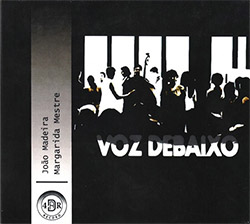





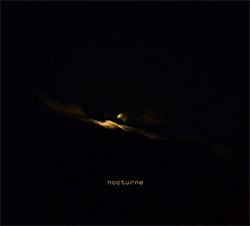
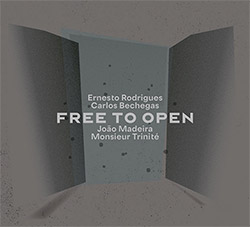
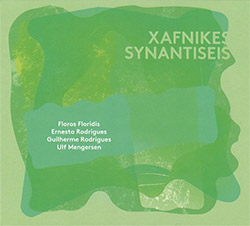
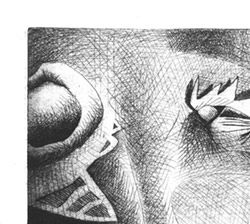





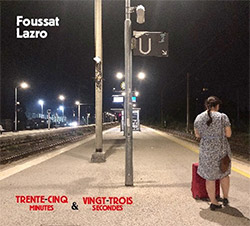

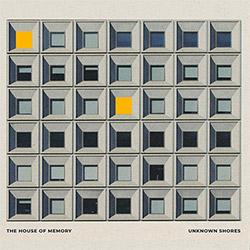




![BlueRing Improvisers: Materia [2 CDs]](https://www.teuthida.com/productImages/misc4/36513.jpg)








![Wheelhouse (Rempis / Adasiewicz / McBride): House And Home [VINYL]](https://www.teuthida.com/productImages/misc4/36462.jpg)
![+DOG+: The Light Of Our Lives [2 CDs]](https://www.teuthida.com/productImages/misc4/36009.jpg)












![Deupree, Jerome / Sylvie Courvoisier / Lester St. Louis / Joe Morris: Canyon [2 CDs]](https://www.teuthida.com/productImages/misc4/36404.jpg)



![Eventless Plot | Haarvol: The Subliminal Paths [CASSETTE + DOWNLOAD]](https://www.teuthida.com/productImages/misc4/36232.jpg)









![Eventless Plot | Francesco Covarino: Methexis [CASSETTE + DOWNLOAD]](https://www.teuthida.com/productImages/misc4/36231.jpg)


![Das B (Mazen Kerbaj / Mike Majkowski / Magda Mayas / Tony Buck): Love [VINYL]](https://www.teuthida.com/productImages/misc4/36329.jpg)


![Eternities: Rides Again [CASSETTE]](https://www.teuthida.com/productImages/misc4/36247.jpg)
![Lopez, Francisco: Untitled (2021-2022) [2 CDs]](https://www.teuthida.com/productImages/misc4/36438.jpg)






![Money : Money 2 [2 CDs]](https://www.teuthida.com/productImages/misc4/35894.jpg)




![Klinga, Erik: Elusive Shimmer [VINYL]](https://www.teuthida.com/productImages/misc4/36258.jpg)
![CHANGES TO blind (Phil Zampino): Volume 9 - I Wave on a Fine Vile Mist [CD + DOWNLOAD]](https://www.teuthida.com/productImages/misc4/36061.jpg)

![Wallmart / Rubbish: Asset Protection [split CD]](https://www.teuthida.com/productImages/misc4/35900.jpg)


![+Dog+: The Family Music Book Vol. 5 [2 CDs]](https://www.teuthida.com/productImages/misc4/35897.jpg)
![Kuvveti, Deli : Kuslar Soyledi [CASSETTE w/ DOWNLOAD]](https://www.teuthida.com/productImages/misc4/36107.jpg)

![Brown, Dan / Dan Reynolds: Live At The Grange Hall [unauthorized][CASSETTE]](https://www.teuthida.com/productImages/misc4/36245.jpg)








![Palestine, Charlemagne / Seppe Gebruers: Beyondddddd The Notessssss [VINYL]](https://www.teuthida.com/productImages/misc4/36206.jpg)
![Palestine, Charlemagne / Seppe Gebruers: Beyondddddd The Notessssss [NEON GREEN VINYL]](https://www.teuthida.com/productImages/misc4/36207.jpg)

![Laubrock, Ingrid: Purposing The Air [2 CDs]](https://www.teuthida.com/productImages/misc4/35639.jpg)

![Yoko, Ono / The Great Learning Orchestra: Selected Recordings From Grapefruit [2 CDs]](https://www.teuthida.com/productImages/misc4/35841.jpg)









![Zorn, John / JACK Quartet: The Complete String Quartets [2 CDs]](https://www.teuthida.com/productImages/misc4/35609.jpg)

![Lonsdale, Eden: Dawnings [2 CDs]](https://www.teuthida.com/productImages/misc4/35480.jpg)



![Sorry For Laughing (G. Whitlow / M. Bates / Dave-Id / E. Ka-Spel): Rain Flowers [2 CDS]](https://www.teuthida.com/productImages/misc4/35985.jpg)

![Rolando, Tommaso / Andy Moor : Biscotti [CASSETTE w/ DOWNLOADS]](https://www.teuthida.com/productImages/misc4/36106.jpg)


![Electric Bird Noise / Derek Roddy: 8-10-22 [CD EP]](https://www.teuthida.com/productImages/misc4/35970.jpg)








![Elephant9 : Mythical River [VINYL]](https://www.teuthida.com/productImages/misc4/34624.jpg)



![Elephant9 with Terje Rypdal: Catching Fire [VINYL 2 LPs]](https://www.teuthida.com/productImages/misc4/35355.jpg)
![Deerlady (Obomsawin, Mali / Magdalena Abrego): Greatest Hits [VINYL]](https://www.teuthida.com/productImages/misc4/34876.jpg)







![Surplus 1980: Illusion of Consistency [CD]](https://www.teuthida.com/productImages/misc4/35069.jpg)
![Staiano, Moe: Away Towards the Light [VINYL + DOWNLOAD]](https://www.teuthida.com/productImages/misc4/35037.jpg)
![Coley, Byron: Dating Tips for Touring Bands [VINYL]](https://www.teuthida.com/productImages/misc4/17906.jpg)

![Lost Kisses: My Life is Sad & Funny [DVD]](https://www.teuthida.com/productImages/misc4/lostKissesDVD.jpg)